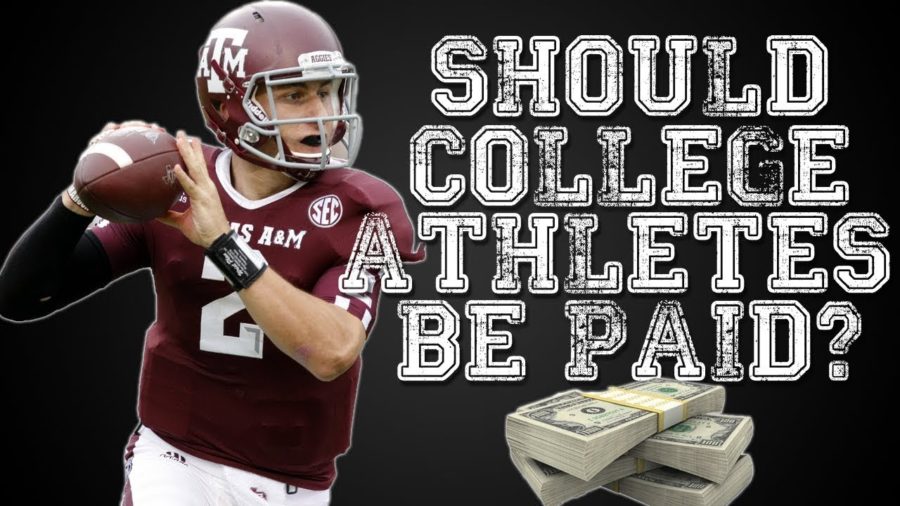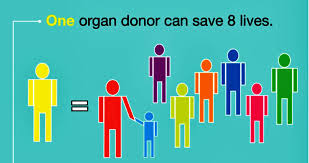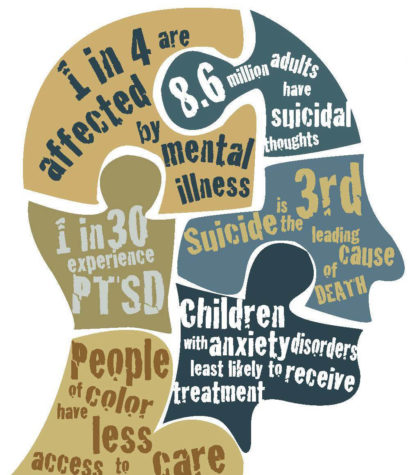Payment of College Athletes
Hundreds of thousands of fans screaming, millions more watching live on national television on a primetime Saturday night college football game. Millions of dollars in bets at stake, the hearts of thousands of loyal, unwavering fans are on the line. Last year when North Carolina won the national basketball championship, the school bought in 10 million dollars! But yet, these athletes are considered amature. There’s no other way to put it: College athletics is a big time business. Universities, TV networks, coaches, and others make money and sell merchandise based on these “amature” athletes, but what do the athletes get in return? A scholarship for their education? But how far can a scholarship go for a kid living paycheck to paycheck on a daily basis? Playing at that level of competition is extremely difficult, and trying to do it under an immense spotlight is huge pressure for kids just coming out of high school. The big question is, should these big-time college athletes receive compensation? This has been an issue for decades, starting with athletes going back to the 70’s and 80’s. There has also been a fair share of controversy surrounding this issue. For example, Ohio State running back Maurice Clarett declared for the NFL draft after his freshman year of college because he needed the money, but was denied entry because of NCAA rules and was unable to play any football for two years. The purpose of my piece is to inform you on big-time college athletics and explore whether the athletes deserve monetary compensation. One thing is clear, these athletes make a sizeable impact on the financial health of the universities. These kids make a huge amount of money for their respective university, they live off a scholarship which only pays for an education, they are sometimes even dragged into scandals looking for money, and have to support themselves and sometimes entire families while trying to stay in school and play at the top of their game every single day.
To start, big-time college athletes are basically working a full-time job and earning their keep with the university year-round. Would it be surprising to learn that almost no college athletes practiced less than the “maximum” amount of 20 hours a week? According to an NCAA survey conducted in 2011, ”Division 1 football players averaged 43 hours of practice a week, baseball came in second with 42.1 hours and basketball in third with 42 hours.” (Walch). This is significantly more than 20 hours. Don’t forget these athletes are required to go to class just like other students, and have to maintain a GPA that makes them eligible to play. Fans of college athletics need to realize that these athletes work their tails off to get to the this level of play. These players are also worth a huge amount of money for the university. According to Cork Gaines from Business Insider, the average division-one athlete is worth $170,098 per year! In big time schools like Louisville, athletes average worth is closer to $1.72 million dollars. In my interview with Coach James, he said that the football team gave his school funding for multiple buildings around campus, and that they wouldn’t have them without athletics. When a school has a star athlete, universities benefit even more, making an enormous amount of money. According to Peter Jacobs of Business Insider, in 2013 after Johnny Manziel won the heisman trophy at Texas A&M, the university raised a record breaking amount of $750 million in one year, which is $300 million more than the previous record year. During this modern day of college athletics, teams are just getting richer and richer, along with the TV networks that broadcast the games. To this point, Ohio state football quarterback Joe Burrow tweeted out, ”Our team is worth 1.5 billion dollars but it wouldn’t be fair to other students if we get a free hamburger.” (Burrow). Big time college programs like Ohio State are worth much more than professional teams! If the Ohio State team turned pro, it would have the fourth highest net rating in the National Football League. Television networks are banking on these college kids as well. According to Roger Sherman, CBS has signed an 8.8 Billion dollar extension with the NCAA to the broadcast rights to “March Madness”. The players are not receiving any of this money they generate for the university and others, but universities say the education the athletes are receiving is enough.
Pro athletes in this modern era are more than just a sports figure, they are full blown celebrities. They have endorsement deals and multi million dollar contracts for whatever sport they play. College athletes play the same game with more passion according to some, but with no opportunity for endorsement deals or any sort of contract. The graphic to the right explains the thought process of a lot of college athletes. What they get is an education from whatever university they decide to attend. In 2014, UCONN basketball player Shabazz Napier was quoted,”Sometimes, there’s hungry nights where I am not able to eat, but I still have to play up to my capabilities every day.” (Lemmons). The grind is real for these athletes, and they don’t all get the best meals or live the high life like the pro athletes do today because of their lack of compensation. Almost any college athlete will say that money is tight because the reality is, they don’t have the time to make money when they’re already in a full-time commitment with the sport. Most people assume that a scholarship can get you through college, but that isn’t the case a lot of the time. Yes, a scholarship is a wonderful opportunity to receive an education, and that should not be taken for granted, but these athletes definitely deserve at least that level of support from the university. Whether or not a scholarship alone is enough is the real question. Jared Walch of the Daily Utah Chronicle states,”Many of these athletes are on scholarship, which pays for tuition and room and board in most cases, and we’ve covered the stipends, which average between $2,000 and $5,000 annually.” (Walch). “Saying college athletes can live off of a scholarship is like saying that this company offers to assist my whole tuition for being a full-time employee, but my paycheck every two weeks works out to be $77. Could I live off that? Even as a full-time employee with access to the employee cafeteria? I don’t think many of us could, yet we expect athletes to do so” (Walch).As stated here, scholarships provide a lot for student athletes, but it would not be easy to live off $2,000-$5,000 a year. Sometimes, players make dumb decisions to get the money they need to sustain. It’s not uncommon to see players go to drastic measures to get money, and this includes star players, too. Going back to Heisman trophy winner Johnny Manziel, in 2013 after he won the award, he got in trouble for selling merchandise to make money and was suspended for a game against Rice University. At Georgia University, running back Todd Gurley, who is now a NFL star got suspended four games for selling autographed material, four years after former Georgia star and current NFL star AJ Green did four years earlier. According to the NCAA, “Players are forbidden from permitting the use of his or her name or picture to advertise.” (Gaines). What the NCAA is saying here is that TV networks, universities, even random people off the street can make money off the name of a college star, but the players themselves cannot make any. This leads to corruption, which can happen a lot more than you would think.
Corruption in the NCAA is a huge problem that has happened at many universities. There have been many attempts to stop things like illegally paying players, but it never seems to work. If paying players was legal, maybe everything could change. College kids that are poor and living under an immense spotlight will do a lot for money, and that is proven most notably through the Boston College point shaving scandal. In the 1978-79 college basketball season at Boston College, some of the team’s best players got involved with underground figures that bribed them to ensure the team would or would not win by the point spread allowing gamblers for or against the team that wins (Lemmons). Throwing big-time college basketball games is a huge risk, so the players must have been in a desperate money situation to get involved. If these athletes were paid, would anything have changed? Many scandals have taken place in the years after, including one at the University of Southern Cal in 2006. According to Bleacher Report, just over three months after Reggie Bush won the Heisman trophy, reports began to surface that he had received hundred of thousands of dollars worth of gifts and benefits while at the school. After investigations, similar allegations had come up about basketball star OJ Mayo. In the end, USC had to strip all wins from 2004 and 2005 which included a national championship along with a two year postseason ban (Miller). Put yourself in the shoes of a 19-20 year old college superstar. If you have no source of income, can you see how it would be difficult to refuse somebody offering you thousands of dollars of gifts? Growing up poor, would you really expect him to say no to the man offering to buy your mom a new car? At Colorado University in 2004, a scandal broke of illegal recruiting on the football team. Head football coach Gary Barnett came under fire plenty of times for his handling of sexual assault allegations. In a span of three years, there had been six rape allegations against six different players. An eight-person panel concluded that sex, alcohol, and drugs were used to lure recruits to the school (Miller). It seems like every year there is a new scandal at a new school, and you can’t help wonder how paying players would limit this, along with helping kids stay in school.
Now this is a topic everyone can agree on. Students staying in school longer is a really, really good thing. A big issue in college sports is students leaving early because they do not have the money to support themselves or a family, or they want to go pro. For the players that don’t have the money, a lot end up as college dropouts, with no scholarship and no ability to play again. For the ones that go pro early, some become stars, but some get injured or don’t pan out, and have no college education to fall back on. Having these student athletes stay in school is one thing all universities should work on, and it seems like there is an easy solution out there for it. Former University of Michigan standout tight end Jake Butt stated in an interview that college players should be compensated for what they do on the field. Coming into the 2017 Orange Bowl, Jake Butt was a projected first round draft pick in the upcoming NFL draft; however, he tore his acl on a freak play ending his season and costing him millions. The quote he used was,“I should be the example of why college athletes should be getting paid in college or why I can’t use my name to benefit off my likeness in college,” (Along with that, he said, ”Why can I see ‘I Like Jake Butt and I Cannot Lie,’ I see those shirts and I’m living paycheck-to-paycheck in college. Who knows? Heaven forbid something happens in the NFL, can I really benefit off of it when it was at the most? No, I can’t.” (Rothstein). What he’s saying here is that he needs money the most now when he’s working as hard as he possibly can, while he is still in school and going to class. He can’t benefit when he needs it the most, which is exactly what UW-Oshkosh coach James said in my recent personal interview. He stated, “As a former D1 college player I know that struggle. I had teammates trying to support families while playing football but it’s almost impossible. College football is a full time commitment: and paying players could help a lot of problems surrounding the game today.” (James) According to a 2015 NCAA report, 65% of college athletes graduated, which means 35% of them drop out or leave college early. Less than 2% of those college athletes go pro, which means ⅓ of all college athletes end up as dropouts. Paying athletes could help these kids finish school and sports without having to worry about financial issues. College athletes aren’t perfect: kids will make mistakes. Overall, they all should be getting what they deserve.
You’re on that field, running down the sidelines into the endzone as all 110,000 people cheer you and your teammates on. But when the game ends, you’re still just another student in the eyes of the NCAA. The impact of this issue is felt at every university in America. There is no doubt about that. Even right in our backyard issues have come up about this topic with Wisconsin Badger basketball star Nigel Hayes. He publicly declared that he felt collegiate athletes should be paid. Now is the time to get involved and make your own decision on this issue. Do your own research, and get to know more college athletes. It’s not as easy as it seems to live like a big-time athlete. These student athletes essentially work full-time jobs in their sports. Scholarships don’t really provide for them financially on a day to day basis. Sometimes they’re lured into corrupt systems, while they have to support themselves and sometimes a family while staying in school. One thing is clear, these athletes make a sizeable impact on the financial health of the universities. For more information on this topic, visit any of the websites in my bibliography, Sports Illustrated, or even talk to some of the athletes personally! Chances are you will get an answer since many athletes feel very strongly about the issues. Now do some research and make an opinion of your own!
Works Cited
Burrow, Joe. “Re: Twitter.” Blog comment. N.p., n.d. Web.
Gaines, Cork. “Chart Shows the Simple Reason Why College Athletes Should Be Paid.” Business Insider. Business Insider, 09 Oct. 2015. Web.
Jacobs, Peter. “Here’s The Insane Amount Of Time Student-Athletes Spend On Practice.” Business Insider. Business Insider, 27 Jan. 2015. Web.
James, Coach. “Do College Athletes Deserve Compensation?” Telephone interview. 10 Oct. 2017.
Lemmons, Malcolm. “College Athletes Getting Paid? Here Are Some Pros And Cons.” The Huffington Post. TheHuffingtonPost.com, 29 Mar. 2017. Web.
Miller, Kerry. “College Football’s Biggest Scandals Since 2000.” Bleacher Report. Bleacher Report, 12 July 2017. Web.
Rothstein, Michael. “Heading to the NFL, Michigan’s Jake Butt Says College Players Should Be Paid.” ESPN. ESPN Internet Ventures, 24 Mar. 2017. Web.
Walch, Jared. “Should Athletes Be Paid to Play? – Daily Utah Chronicle.” Daily Utah Chronicle. University of Utah Student Media, 17 Oct. 2016. Web.
Sherman, Roger. “The NCAA’s New March Madness Deal Will Make Them a Billion Dollars a Year.” SB Nation, Vox Media, 12 Apr. 2016,







